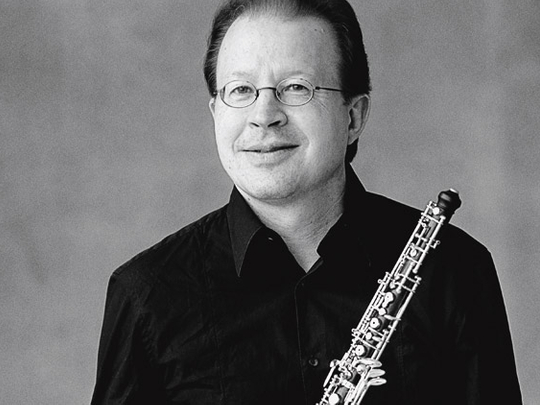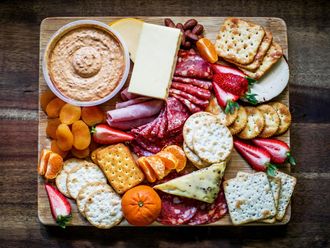
Born into a family where the gentle strains of the piano and the haunting melodies of the organ reverberated through the walls of his home in Munich every day, it was but natural that young Andreas Wittmann would soon soak up a variety of musical influences while inheriting the musical propensity shared by both his father and grandfather.
“Music has always been an integral part of my life,” says Wittmann, oboist in the prestigious Berliner Philharmoniker (Berlin Philharmonic Orchestra). “I come from a very musical family – both my father and grandpa played the organ and piano – and every day there was some music going on in the house.”
It was at the age of eight that Wittmann began learning the piano and when he was 12, his father suggested it was time to learn a second instrument. “My father wanted me to choose a wind instrument; he did not like string instruments,” recalls Wittmann. “As a child, he had taken violin lessons but an inept teacher quickly killed his interest in that.”
Soon thereafter, on a vacation to Italy, Wittmann’s family made a brief stop at Salzburg in Austria, the birthplace of Mozart. While passing by The Festival Hall, he heard someone practising near an open window. “I paid attention to the instrument being played and
I was fascinated by its very special sound which struck a chord with me instantly. It was a sound, which seemed to be close to the human voice and I was curious to know what it was,” he says. “My father said it was an oboe, and I told him that I liked the sound of it.”
Sometime later, when his parents gifted him a recording of Mozart’s Oboe Concerto, he was absolutely convinced about the choice of instrument he wanted to learn, and at the age of 12 he began oboe studies with Heinz Brune in Regensburg. “I was very lucky to have him as a teacher because he had totally dedicated his life to teaching young people, and was extremely good with beginners. He supported me from day one, and often taught more than the stipulated one hour lesson per week.”
In 1976, Wittmann entered the School of Music and Performing Arts Munich and in 1977, at age 16, he won first prize in the prestigious “Young Musicians” competition. “This was a turning point in my life as from that moment on I was certain that I wanted to be a professional oboe player,” he says.
In 1982, Wittmann joined the University of Arts in Berlin and graduated three years later. He then auditioned at the Berlin Philharmonic Orchestra Academy. “Winning the audition and to dream of the possibility of perhaps playing in the Orchestra just about changes your life,” he says. That moment came when within a year, his predecessor retired, and after another audition, he was appointed to the Berlin Philharmonic Orchestra in 1986.
Today, Wittmann also performs regularly as principal oboist in the Bayreuth Festival Orchestra and is also an instructor in the Orchestra Academy in Berlin. Wittmann was in Abu Dhabi recently when the Berlin Philharmonic Orchestra performed at the Emirates Palace Auditorium featuring symphonies by Haydn and Brahms in its first concert in the Arab world after a hiatus of 42 years.
I, ME, MYSELF
I believe my life’s high notes have been the birth of my two children, Isabel and Lucas.
I touched a high note in my musical life when I was appointed to the Berlin Philharmonic Orchestra. I am lucky to have experienced the genius of many great artists such as our former opera conductor Herbert von Karajan and Austrian classical conductor Carlos Kleiber. Being in the orchestra gave me the opportunity to play with so many other talented musicians, fabulous conductors and great soloists.
I look upon every concert as a joy that makes my life richer. I am a very happy man to be in this profession which, I believe, is the best because you can express yourself with your instrument. In this way, you impart joy and happiness to people in so many different countries be it in the US, Japan, South America, Europe or the UAE.
It is strange, but sometimes I experience a very direct connection with the audience; I cannot explain why. It could be that they understand what we are trying to say with our instruments. There are 128 members in the Berlin Philharmonic Orchestra and sometimes, we discern a lack of concentration in the audience but it is our job to play in such a manner that they get absorbed in the music. The quality of the concert does not depend solely on the musicians on the stage; it also depends on the public. As musicians, we can feel on the stage the inner vibrations of the audience, and when we play with our heart and our soul, it can move the audience in profound ways. When
I pick up the oboe and play, I feel like a singer. This instrument helps me express what I feel; the oboe is my voice.
I believe the power of music lies in its strong, soul-healing ability. It has the power to evoke a spectrum of emotions; often gripping and irresistible that seems to emerge from nowhere. Music is a language that nobody speaks – you just hear sounds – but it can touch the depths of your soul, inspire creativity, calm inner turmoil and lead a way into the subconscious.
I admire the great conductors, especially great soloists, and all the fantastic composers such as Mozart, Bach, and Beethoven, who have bequeathed us a very fine treasure by composing the masterpieces that they did. I cannot fathom how human beings can create such incredible music.
I enjoy chamber music because it trains your ears in a different way. It is a much more intimate way of playing music especially because of the smaller size of the musicians and the audience. There are 30 or more chamber music groups within our orchestra.
If I had missed out on music – that’s a scenario I just cannot imagine! Perhaps I would have been a painter as I like to paint or I would have been involved in some other art.
I am grateful to my parents for introducing me to music and making it a permanent part of my life. I am also grateful to have had the opportunity to study under the guidance of very good teachers. This is very important, especially your first teacher who introduces you to the instrument, as he/she can make or mar your interest in music. It has been my dream since childhood to be able to play in the Berlin Philharmonic Orchestra. I am so grateful that this has become a reality – it has changed my life.
I am passionate about Japanese calligraphy. It fascinates me. When I joined the orchestra, one of my first new experiences was a tour of Japan. For me, it represented a totally new world and I have since been charmed by the very fine and cultivated culture of this country. I practise calligraphy whenever time permits. I also paint in oil, and love languages. Besides my mother tongue, I can communicate in French, Italian, Spanish and English.
I wish that people in the world would come together to participate in more creative activities such as art or sports, for example. I think listening to music, painting or enjoying sports would bring about much needed peace and unite the world in its efforts against war and other forms of violence.
I, ME, MYSELF
Me and the need to express myself: It is very important to express what you feel and I am very lucky that I can do it with my instrument. However, expressing yourself through music alone is not enough; periods of silence are also an important part of a piece of music. It is only through silence that the difference between separate sounds can be experienced. Sometimes these silent notes are more important than the sounds that precede or follow it; often people just never hear the silence in music.
Me and my initial years in the Berliner Philharmoniker
To enter the orchestra is not an easy task. First is the audition, followed by a two-year trial. For many, this is a psychologically shattering experience and it is common for newcomers to fail their trial years. I was just a young 25-year-old musician with no previous experience, so everything was new and a bit frightening for me.
Our principal conductor, Herbert von Karajan, was a towering personality, and I felt scared to play under his baton. Especially when new players entered the orchestra, he was constantly observing them and I could feel his eyes focused on me all the time – this only aggravated my uneasiness!
Me and taking risks in music
Taking risks is very important in music. If you don’t take risks, the music becomes very boring. The best musicians in the world are taking risks all the time by going farther and farther to widen the limits. If you don’t take risks in music, everything would be superficial and mediocre.
Me and my place in this world
I am just a tiny speck in this world but I try to give joy to people – this is the mission of my life as I see it. But with so many problems facing the people of the world, joy can be a very relative term. Therefore I try to be of service to humanity by using music to serve the cause of several charity programmes that help the poor. The Berliner Philharmoniker has been an international Unicef Goodwill Ambassador since 2007. We hold benefit concerts to help improve the lives of children the world over.
Me and my family
I have two kids – a daughter, Isabel, aged 17, and a son, Lucas, who is 19. Isabel plays the viola while Lucas is a piano player. They love music but I doubt they will follow in my footsteps and take music as a profession. My wife, Monica, is an oboe player too.
I, ME, MYSELF
What, according to you, are some of the challenging aspects of working in a top orchestra?
First of all, the sheer quality of every player in the orchestra challenges you every day. You hear around you all these fantastic players and this is such a high motivation for me that I am constantly improving myself all the time. I’ve come a long way now – performance wise – since joining the orchestra 24 years ago. Nobody in this orchestra is ever satisfied and content – we are in a constant endeavour to become better and better.
What are the self-improvement habits you have adopted for achieving excellence?
I just can’t emphasise enough the need to practise and practise. You have to study a lot at home to improve. When you play with those fine players in the orchestra, or listen to excellent soloists, great violinists and pianists, and if you understand what they are doing, you can improve all the time.
What were some of your most memorable experiences performing with the Berlin Philharmonic Orchestra?
There have been many; what immediately comes to mind are the incredible concerts with von Karajan when I first joined the orchestra; the time when Carlos Kleiber twice conducted the orchestra – I will never forget that. And now with Sir Simon Rattle at the helm, we have done some great performances, especially the recent Bach’s St Matthew Passion in Birmingham where the entire city seemed to share our passion and enthusiasm.
How did you deal with the low points in your career?
It is normal to sometimes feel off the mark or not so fit. There are times when I feel I am not playing well enough. It is very important, therefore, to learn certain techniques to discover what is not going right. In other words, being your own teacher is the most important thing.












